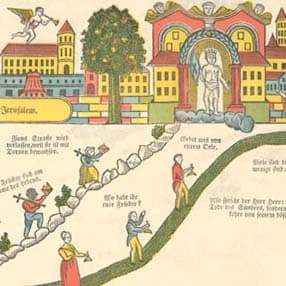
“Broadsides” (or “broadsheets,” in Britain and elsewhere) are pieces of paper printed on one side, for sale or distribution at fairs, markets, or by peddlers who roamed the countryside with them. Some, like baptismal and marriage certificates, were kept, while others were often discarded after use. They can all be subsumed under the useful rubric of “ephemera.” From the Greek ephemeris, meaning “of a day,” ephemeral items were things not meant to last.
The Pennsylvania Germans or Pennsylvania Dutch – the terms are equivalent – are the descendants of German-speaking emigrants who settled in Pennsylvania beginning in 1683, with the founding of Germantown, and continuing to about 1815 to 1820, the close of the Napoleonic Wars in Europe. The German emigrants of the later 19th century, including the colorful 48ers, were different in culture and outlook and are properly called “German-Americans.” The Pennsylvania Dutch culture that has been developing here for three centuries is a rich mélange of European and American culture traits that combine to form a viable hybrid American culture. This vital American culture is still evident in Pennsylvania and in areas settled by the Pennsylvania Dutch Diaspora in the 18th and 19th centuries.
Curated by Wendy Woloson, 2006.
Resources
Pennsylvania German Broadsides: Windows into an American Culture Online Exhibition


